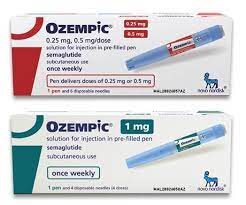The weight loss injections: Obesity has become a global epidemic, affecting millions of people worldwide. In 2016 alone, over 2 million deaths were attributed to being an overweight or higher-weight person. The World Health Organization (WHO) estimates that by 2030, obesity will affect almost every country worldwide.
Obesity is a significant public health issue. It is linked to multiple diseases, like heart disease, stroke, type 2 diabetes, and cancer, among others. Obesity is also associated with other conditions, like depression, anxiety, and chronic pain. What is the Obesity Help That Will Change Your Life Forever?
What Obesity Is? - The Game Changers In Weight Loss Treatments
Many health experts are heralding a new treatment for weight loss as a “game changer” and a potential “game-breaker” in the growing epidemic of overweight and obesity.
The FDA has approved semaglutide, an injection made by the pharmaceutical company Novo Nordisk, for patients struggling with chronic weight gain. Semaglutide may help patients lose weight and maintain their weight loss.
“Obesity is a disease that affects millions of Americans,” said Dr. Robert F. Kushner, a professor at Northwestern University Feinberg School of Medicine. “It is associated with many other diseases, including diabetes, heart disease, stroke, cancer, and arthritis. We don’t use these terms lightly.”
According to the CDC, currently, 42.4% of all adults in the United States suffer from obesity, which is defined as having a BMI of 30 or above.
“Today’s approval offers adults with obesity or overweight a beneficial new treatment option to incorporate into a weight management program,” John Sharretts, deputy director of the Division of Diabetes, Lipid Disorders, and Obesity in the FDA’s Center for Drug Evaluation and Research, said.
The FDA approved semaglutide in 2019 to treat type 2 diabetes and sold it under the brand name Ozempic. Semaglutide reduces hunger and increases satiety, leading to potential weight loss when combined with exercise and counseling sessions with nutritionists to maintain a low-calorie diet.
Are Weight Loss Injections (Medications) Effective?
Yes, weight loss injections can be effective when used appropriately. However, their success often depends on individual factors, adherence to prescribed guidelines, and their combination with lifestyle changes.
Here are some key points to consider:
- Individual Variation: The effectiveness of weight loss medications can vary significantly from person to person. Genetics, metabolism, and overall health can influence their efficacy.
- Lifestyle Changes: Medications are typically more effective when combined with healthy lifestyle changes, including a balanced diet and regular exercise.
- Medical Supervision: It’s crucial to consult with a healthcare professional before starting any weight loss medication. They can assess your needs, monitor progress, and address potential side effects.
- Short-Term vs. Long-Term Effects: While some medications can lead to significant weight loss in the short term, long-term weight management often requires a combination of medication and lifestyle changes.
- Potential Side Effects: All medications have the potential for side effects. Discussing these with your healthcare provider and weighing the benefits against the risks is essential.
Remember: Weight loss medications are not a magic bullet. They can be a valuable tool when used with a healthy lifestyle, but they should not be viewed as a substitute for making positive changes to one’s habits.
| Medication | Generic Name | Minimum Age | Drug class | Approved usage(s) | Prescribed usage(s) |
| Mounjaro | Tirzepatide | 18 | GLP-1 and GIP receptor agonist | Type 2 diabetes | Type 2 diabetes/ overweight/obesity |
| Ozempic | Semaglutide | 18 | GLP-1 receptor agonist | Type 2 diabetes/ heart disease prevention* | Type 2 diabetes/ heart disease prevention*/ overweight/obesity |
| Wegovy | Semaglutide | 12 | GLP-1 receptor agonist | Overweight/obesity/ heart disease prevention** | Overweight/obesity/ heart disease prevention** |
| Zepbound | Tirzepatide | 18 | GLP-1 and GIP receptor agonist | Overweight/obesity** | Overweight/obesity |
Ozempic® is an injectable, noninsulin medicine used:
- In addition to staying active and maintaining a healthy diet, improving blood sugar control is crucial for adults with type 2 diabetes.
- To reduce the risk of major cardiovascular events such as heart attack, stroke, or death in adults with type 2 diabetes and known heart disease.
- A once-weekly medicine for adults with type 2 diabetes is used to improve blood sugar, along with diet and exercise, and reduce the risk of major cardiovascular events such as heart attack, stroke, or death in adults with type 2 diabetes and known heart disease.
While Ozempic® Is Primarily for Type 2 Diabetes, Significant Weight Loss May Occur
Ozempic (semaglutide) is a medication approved for use in adults with type 2 diabetes. It works in conjunction with diet and exercise to improve blood sugar levels, and, importantly, has also been shown to reduce the risk of major cardiovascular events in adults with type 2 diabetes and heart disease.
While not explicitly approved as a weight-loss drug at lower doses, clinical trials have consistently demonstrated that significant weight loss is a common side effect for many individuals using Ozempic for their type 2 diabetes.
For example, studies involving adults with type 2 diabetes (with an average starting weight of around 90-100 kg or 198-220 pounds) who took Ozempic showed notable weight reduction. In a 40-week study, patients receiving the 1 mg weekly dose lost an average of approximately 5.6 kg (12 pounds). In comparison, those on the 2 mg weekly dose lost an average of roughly 14 pounds (6.4 kg), compared to the placebo group.
It is crucial to note that higher doses of semaglutide are approved and explicitly marketed for weight loss under the brand name Wegovy. Clinical trials for Wegovy, which contains a higher dose of semaglutide (up to 2.4 mg weekly), have demonstrated even more substantial weight loss, with participants losing an average of approximately 15% of their body weight over a longer period (approximately 68 weeks) when combined with lifestyle interventions.
Therefore, while the initial statement that Ozempic “is not a weight-loss drug” is technically correct in terms of its primary FDA indication at lower doses, it’s essential to acknowledge the well-documented and often significant weight loss experienced by many users as a secondary benefit and the existence of a higher-dose formulation (Wegovy) specifically for weight management.
Mounjaro vs. Ozempic, Wegovy — Weight Loss Injections
While approved for diabetes, Mounjaro and Ozempic, along with Wegovy, also help people lose weight by increasing feelings of fullness. Ozempic and Wegovy act like a hormone your body makes (GLP-1 receptor agonists). Mounjaro works similarly, but it acts like two hormones instead of one, as it is a dual GIP and GLP-1 receptor agonist.
Compared to Ozempic, Mounjaro might work even better for weight loss. One study showed that a 15-milligram dose of this drug taken every week led people to lose more than 20% of their body weight. Ozempic can help you lose an average of 15%-20% of your weight, with some studies indicating an average closer to 10-15%. Wegovy, which contains higher doses of the same active ingredient as Ozempic (semaglutide) and is specifically approved for weight loss, has demonstrated an average weight loss of approximately 15% in clinical trials, with some individuals achieving a weight loss of 20% or more.
You will likely need to continue taking them to maintain the weight loss. If you need to lose a significant amount of weight, you may want to consider other options, such as weight loss surgery. Experts recommend being cautious when considering Ozempic, Mounjaro, or Wegovy for weight loss, so you can make an informed decision, taking into account their side effects, costs, and other factors.
Mounjaro Reviews: Key Takeaways
Significant Weight Loss Reported
Many individuals using Mounjaro have experienced substantial weight loss, often achieving results that surpass those from previous weight management strategies. This significant reduction in body weight has been associated with increased confidence and improved overall well-being, as noted in user reviews.
Effective Appetite Suppression and Reduced Cravings
A recurring positive aspect highlighted in Mounjaro reviews is its ability to effectively suppress appetite and diminish food cravings. Users frequently report feeling fuller for extended periods and experiencing a decreased desire for less healthy food options, which facilitates better adherence to dietary plans.
Improved Glycemic Control in Type 2 Diabetes
For individuals with Type 2 Diabetes, Mounjaro has shown promise in significantly lowering blood sugar levels and improving overall glycemic control, as noted in various reviews. This improvement has sometimes led to a reduction in the need for other diabetes medications.
Common Gastrointestinal Side Effects
Several reviews mention gastrointestinal side effects such as nausea, vomiting, diarrhea, and constipation, particularly during the initial stages of treatment or following dosage adjustments. The severity and duration of these side effects can vary among individuals.
Positive Impact on Overall Health Markers
Beyond its primary functions, some users have reported improvements in other health markers, including lower blood pressure, better cholesterol levels, and increased energy. These positive changes contribute to an enhanced quality of life for some individuals taking Mounjaro.
Which Weight Loss Injection (Drug) Is Best?
Mounjaro, Ozempic, Wegovy, and Zepbound work similarly for weight loss. Ozempic and Wegovy are both semaglutide. Mounjaro and Zepbound are other tripeptide drugs. Clinical trials have shown that taking either semaglutide or tirzepatide can make you lose weight. However, the first studies didn’t compare the two.
To look at this, one recent study looked at weight loss and side effects in adults who were overweight or obese. Some of them got tirzepatide, while others got semaglutide.
It turned out that people taking tirzepatide lost more weight than those taking semaglutide. This was true after 3 months and a year. The side effects of both drugs were also similar. However, we need further research to understand the long-term differences and how taking either of these drugs affects one’s health.

I’m diabetic and take 1g of metformin twice a day. I started on Ozempic in late November or early December last year and have lost 2.5 stone – so nice n steady. My HBA1C was 79, and is now 29!!! I’m taking random blood sugars during the day after meals and I’m now between 5 and 6 mmol/l.
Nicole

For anyone considering Mounjaro for weight loss, it is crucial to remember that it is a tool, not a magic bullet. While it can be very effective in suppressing appetite and aiding weight loss, it works best when combined with a healthy lifestyle – balanced diet and regular exercise
Patrycja

Starting Mounjaro has been a game-changer for my weight loss journey. The reduced appetite is significant, making it much easier to stick to a calorie deficit without feeling constantly deprived. Although the initial nausea was somewhat challenging, it subsided within a few weeks, and the consistent weight loss has been incredibly motivating. Worth discussing with your doctor if you’re struggling with weight management.
Jesse

I started Ozempic just under a year ago, having been on Saxenda, losing only 10 pounds on Sax before the effects wore off and I regained weight, plus more, going up to my heaviest 15st 1 lb. It’s been slow. In the first 6 months on Ozempic I lost about 16 pounds and then weight loss stopped. I kept on it and have found my appetite and mental relationship with food have changed and I gradually lost more. I’m now 12th 11lbs. I have around another stone at least to lose. Keep with it, for some of us, the process is slower. I’ve had no side effects.
Monica
Update September 2025 – Scientists Are Developing A New Weight-Loss Drug That Has Fewer Side Effects Than Other GLP-1s. Here’s What To Know
- Scientists and researchers are working on a new type of weight loss drug called a tetra-agonist.
- The new medication is designed to aid in weight loss with fewer side effects.
- Here’s what doctors and experts want you to know about this new drug.
We’ve all heard about the uncomfortable side effects that come with taking GLP-1 medications like Ozempic and Wegovy: upset stomach, constipation, nausea, hair loss… The list goes on. But researchers are hard at work on a new class of weight loss medication that promises to combat obesity with fewer side effects.
Meet the experts: Mir Ali, MD, is the medical director of MemorialCare Surgical Weight Loss Center at Orange Coast Medical Center in Fountain Valley, CA; Christoph Buettner, MD, PhD, is chief of the division of endocrinology at Rutgers Robert Wood Johnson Medical School.
What is this new medication?
The new medication doesn’t actually have a name just yet, but experts are calling it a tetra-agonist (“tetra” is a Greek-derived word for four) because it acts on four different hormones in the body.
Most current weight loss medications target one, two, or three hormone receptors that influence how well your body breaks down glucose (i.e., blood sugar) and regulate your appetite. But this medication, which was created by researchers at Tufts University, targets a fourth receptor. The researchers’ findings so far were just published in the Journal of the American Chemical Society.
What are the four hormones this drug works on?
This drug works on four different hormones that are released after you eat:
- GLP-1, which is targeted by Ozempic and Wegovy
- GIP, which is targeted by Zepbound and Mounjaro
- Glucagon, which helps to suppress appetite
- PYY, which is the new hormone this medication targets
What is peptide YY?
Peptide YY is a hormone secreted by the gut after you eat, as explained by the researchers in the study. It reduces your appetite and slows the process of food emptying from your stomach.
How is this drug different from Ozempic and Wegovy?
It all comes down to how many hormones the drug targets. Wegovy and Zepbound are the two major drugs that are currently approved by the Food and Drug Administration (FDA) for weight loss. “Wegovy affects one hormone receptor, while Zepbound impacts two,” says Mir Ali, MD, medical director of MemorialCare Surgical Weight Loss Center at Orange Coast Medical Center in Fountain Valley, CA. “Zepbound is more effective for weight loss. If there’s a medication that impacts more receptors, there’s the potential to be even more efficient.”
Does it have any side effects?
It’s not clear at this point. By targeting a fourth hormone, researchers think the drug may lead to fewer side effects—that’s the goal, after all—but human trials need to be conducted first to know for sure.
Dr. Buettner points out that glucagon, which is targeted by the new medication, can raise a person’s heart rate and may impact the liver. So, more research is needed to understand the full physical impact of the medication. “It needs to be carefully tested,” he says. “The proof is in the pudding.”
It’ll take some time before this drug is available. “It needs to be studied in animal and human trials first,” Dr. Ali says. Finding more effective medications to aid in weight loss is always a good idea. But this is a long way from being ready for humans.”
But keep an eye on this one!



Living with diabetes doesn’t mean you can’t live fully! Try the new injection pens for weight loss
Discover the power of #Ozempic! This FDA-approved medication helps you shed pounds by reducing appetite, curbing cravings, and promoting fullness. It’s time to take control of your weight and reclaim your confidence!
This is an interesting discussion about Ozempic as a potential obesity solution. It’s important to remember that medication should be part of a holistic approach that includes lifestyle changes like diet and exercise. Has anyone combined Ozempic with lifestyle modifications? I’d love to hear about how this integrated approach worked for you. Let’s keep inspiring each other on our health journeys!
This post on Wegovy / Ozempic is a great reminder of the advancements in healthcare solutions for obesity and diabetes! It’s important to remember that medication is just one piece of the puzzle. Combining it with lifestyle changes like diet, exercise, and mental health support can really make a difference
Tired of yo-yo dieting? Explore the benefits of weight loss injections.